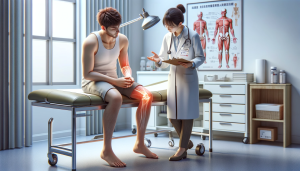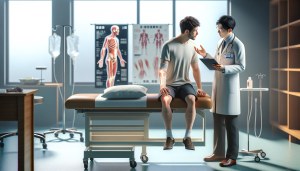Unveiling the Legal Resources: Understanding Traumatic Brain Injury in Auto Accident - Symptoms, Treatments, and Your Rights
Introduction
Traumatic Brain Injury (TBI) is a serious condition that can have life-altering effects. Understanding TBI, especially when it results from an
auto accident, is crucial for victims and their families. This article aims to shed light on the symptoms, treatments, and legal rights associated with TBI caused by auto accidents.
Understanding Traumatic Brain Injury
What is TBI?
TBI occurs when an external force causes brain dysfunction. This can result from a violent blow to the head, a sudden jolt, or an object penetrating the skull. In the context of
auto accidents, TBI is a common and severe injury.
Common Causes of TBI in Auto Accidents
Auto accidents can cause TBI through direct impact, whiplash, or even the brain striking the inside of the skull due to sudden deceleration. Understanding these causes helps in recognizing the risk and taking preventive measures.
Symptoms of Traumatic Brain Injury
Physical Symptoms
TBI can manifest in various physical symptoms such as headaches, dizziness, nausea, and fatigue. More severe cases may include loss of consciousness, seizures, and coordination problems.
Cognitive Symptoms
Cognitive symptoms include confusion, memory loss, difficulty concentrating, and impaired judgment. These can significantly affect daily life and work performance.
Emotional and Behavioral Symptoms
Victims may experience mood swings, depression, anxiety, and changes in behavior. These symptoms can strain relationships and affect overall well-being.
Diagnosis of TBI
Initial Assessment
Immediately after an accident, a medical professional will conduct an initial assessment to check for signs of TBI. This includes checking consciousness levels and basic neurological functions.
Imaging Tests
CT scans and MRIs are crucial in diagnosing the extent of brain injury. These imaging tests help in identifying any bleeding, bruising, or other damage to the brain.
Neuropsychological Evaluations
These evaluations assess cognitive function and help in understanding the impact of TBI on memory, attention, and problem-solving skills.
Treatments for TBI
Immediate Medical Attention
Prompt medical attention is vital. Emergency care often involves stabilizing the patient, controlling bleeding, and preventing further injury.
 Medications
Medications
Medications can help manage symptoms such as pain, seizures, and depression. They are an essential part of the treatment plan.
Rehabilitation Therapies
Physical therapy, occupational therapy, and speech therapy are crucial for recovery. These therapies help restore lost functions and improve the quality of life.
Long-term Effects of TBI
Physical Effects
Long-term physical effects can include chronic pain, motor function impairment, and sensory problems. These can necessitate ongoing medical care and support.
Cognitive Effects
Cognitive deficits may persist, affecting memory, attention, and executive functions. This can impact daily activities and job performance.
Emotional and Psychological Effects
Long-term emotional and psychological effects can include depression, anxiety, and PTSD. Support from mental health professionals is often required.
Legal Rights After a TBI from an Auto Accident
Understanding Your Legal Rights
Victims of TBI have the right to seek compensation for their injuries. Understanding these rights is crucial for accessing the necessary resources and support.
Importance of Legal Representation
An experienced attorney can help navigate the complex legal landscape, ensuring that victims receive fair compensation.
Immediate Actions
Ensure safety, call emergency services, and gather information. Documenting the scene and collecting witness statements can be vital for any future legal claims.
Documenting the Accident
Take photos, note down details, and keep all records. Proper documentation supports your case and helps in the accurate filing of claims.
Seeking Medical Attention
Even if injuries seem minor, seek medical attention immediately. Some TBI symptoms may not be apparent right away but can develop over time.
Understanding Personal Injury Claims
Personal injury claims seek to compensate victims for injuries caused by another's negligence. Understanding the basics can help in preparing for the process.
The Process of Filing a Claim
Filing a claim involves gathering evidence, documenting medical treatments, and working with legal professionals to build a strong case.
Compensation for TBI Victims
Types of Compensation
Compensation can cover medical expenses, lost wages, pain and suffering, and more. Knowing what you're entitled to is essential for a fair settlement.
Factors Affecting Compensation Amounts
Factors include the severity of the injury, the impact on daily life, and the degree of negligence involved. An attorney can help in evaluating these factors.
Choosing the Right Attorney
Qualities to Look for in an Attorney
Look for experience, specialization in TBI cases, and a track record of successful outcomes. A good attorney will be compassionate and communicative.
How to Find a Specialized TBI Attorney
Research online, ask for recommendations, and consult with multiple attorneys before making a decision.
The Legal Process
Overview of the Legal Process for TBI Cases
Understand the steps from filing a claim to potentially going to trial. Knowing what to expect can alleviate stress and confusion.
Preparing for Court
If your case goes to court, preparation is key. Work closely with your attorney to gather evidence, prepare testimonies, and build a strong case.
Challenges in TBI Legal Cases
Common Challenges Faced by TBI Victims
Challenges include proving the extent of the injury, dealing with insurance companies, and managing the emotional toll of the process.
Strategies to Overcome These Challenges
Effective strategies include thorough documentation, expert testimonies, and strong legal representation.
Support Resources for TBI Victims
Medical Support Resources
Access to quality healthcare providers and rehabilitation services is crucial. Seek out specialized TBI clinics and support groups.
 Legal Support Resources
Legal Support Resources
Legal aid organizations and attorney networks can provide valuable support. Don't hesitate to reach out for help.
Community and Psychological Support
Community support groups and mental health professionals can offer emotional and psychological assistance. These resources are essential for holistic recovery.
Conclusion
Understanding TBI in the context of
auto accidents is vital for victims and their families. Recognizing symptoms, seeking appropriate treatments, and knowing your legal rights can significantly impact recovery and compensation. Remember, you're not alone—legal and medical resources are available to support you through this challenging journey.
Look for an attorney who has the right legal resources for your legal needs.
Contact us here on the
Warmuth Law website or through our hotline 888-517-9888.
Frequently Asked Questions (FAQ's)
1. What is the first step after a TBI in an auto accident?
Seek immediate medical attention, even if symptoms are not apparent. Early diagnosis and treatment are crucial for recovery.
2. How long do I have to file a personal injury claim for TBI?
The statute of limitations varies by state but typically ranges from one to three years. Consult with a lawyer to understand specific timelines.
3. Can I receive compensation for emotional distress caused by TBI?
Yes, emotional distress is a recognized form of damage, and victims can seek compensation for it as part of their
personal injury claim.
4. How can a lawyer help with my TBI case?
A lawyer can navigate the legal system, gather evidence, negotiate with insurance companies, and represent you in court if necessary, ensuring you receive fair compensation for your injuries.
5. What are the most important documents to have for my TBI case?
Key documents include medical records, accident reports, witness statements, photos of the accident scene, and any correspondence with insurance companies. Keeping thorough documentation strengthens your case.
 Medications
Medications can help manage symptoms such as pain, seizures, and depression. They are an essential part of the treatment plan.
Rehabilitation Therapies
Physical therapy, occupational therapy, and speech therapy are crucial for recovery. These therapies help restore lost functions and improve the quality of life.
Medications
Medications can help manage symptoms such as pain, seizures, and depression. They are an essential part of the treatment plan.
Rehabilitation Therapies
Physical therapy, occupational therapy, and speech therapy are crucial for recovery. These therapies help restore lost functions and improve the quality of life.
 Legal Support Resources
Legal aid organizations and attorney networks can provide valuable support. Don't hesitate to reach out for help.
Community and Psychological Support
Community support groups and mental health professionals can offer emotional and psychological assistance. These resources are essential for holistic recovery.
Legal Support Resources
Legal aid organizations and attorney networks can provide valuable support. Don't hesitate to reach out for help.
Community and Psychological Support
Community support groups and mental health professionals can offer emotional and psychological assistance. These resources are essential for holistic recovery.











